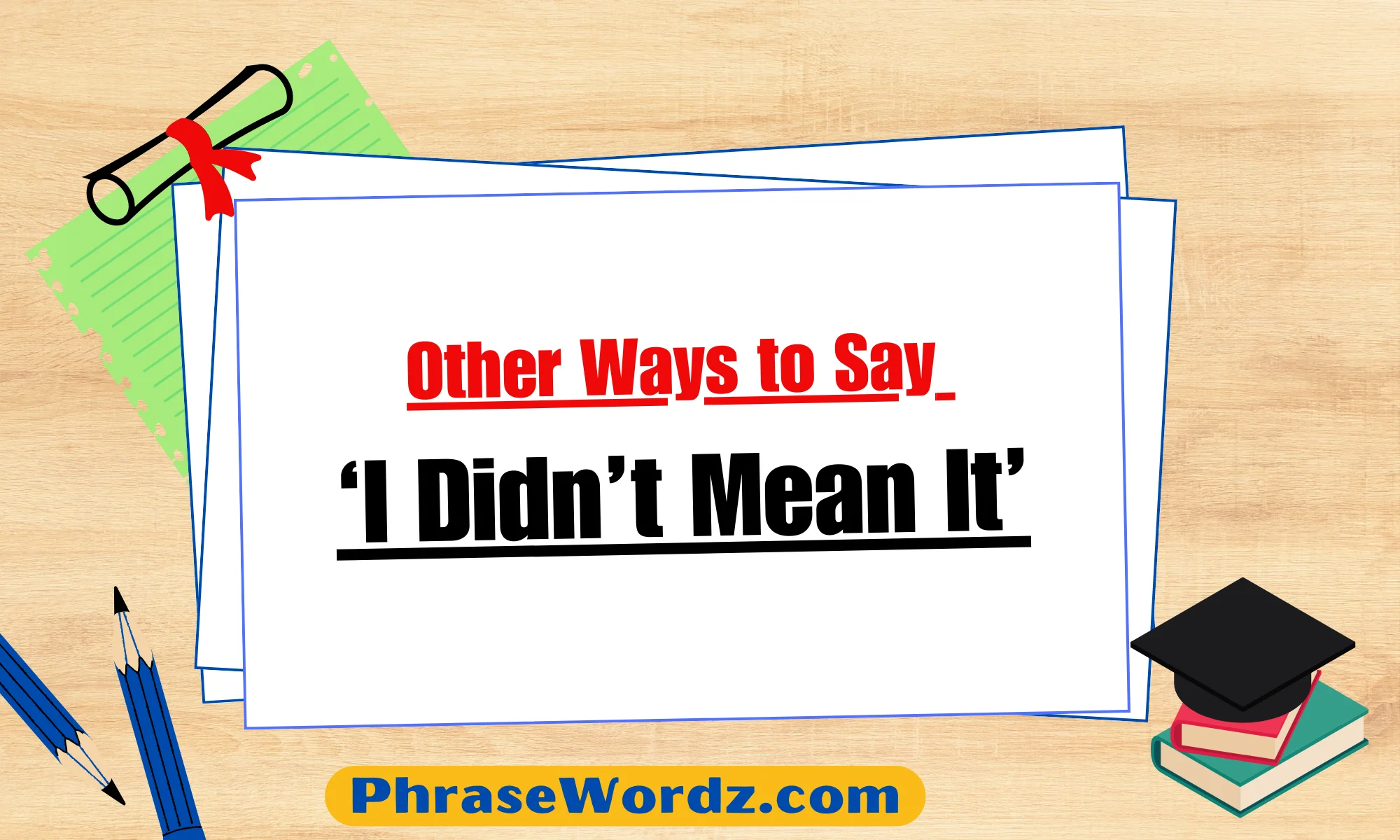Miscommunication is a common part of life, but sometimes words spoken unintentionally can hurt feelings. When this happens, it’s important to make amends by offering a heartfelt apology. Below are alternative ways to say ‘I didn’t mean it,’ along with examples for each scenario, written as emails or messages.
Discover thoughtful phrases to express regret and sincerity when saying “I didn’t mean it.” Enhance your communication skills with alternatives like “It wasn’t intentional,” “I misspoke,” or “Please forgive me, I didn’t realize.”
List Of Other Ways to Say ‘I Didn’t Mean It’
- That wasn’t my intention.
- I didn’t mean to upset you.
- I didn’t realize how that came across.
- I misspoke, and I’m sorry.
- I apologize for the misunderstanding.
- I should have phrased that differently.
- I see how that hurt you, and I regret it.
- I didn’t mean for it to come out like that.
- My words didn’t reflect how I truly felt.
- I take full responsibility for my words.
- I didn’t mean to offend you.
- I see now how that sounded hurtful.
- I regret saying that, and I’m sorry.
- I understand why you’re upset, and I’m sorry.
- I didn’t intend for my words to be taken that way.
- I know that was hurtful, and I’m sorry.
- I didn’t mean to sound like that.
- That wasn’t my true intention.
- I’m sorry if I made you feel bad.
- I didn’t mean to cause any hurt.
1. I Apologize for My Words
Subject: I’m Sorry About What I Said
Hi Mia,
I’ve been reflecting on our conversation, and I want to sincerely say that I apologize for my words. They were said in a moment of frustration, and they didn’t reflect what I truly felt. I didn’t mean to upset you, and I hope you can forgive me for causing any hurt.
You mean a lot to me, and I would never intentionally say something to hurt you. Let’s talk soon so I can make things right.
Warmly,
Hannah
Expertise Addition:
This phrase focuses on the words themselves, allowing you to specifically acknowledge the problem. It works well when you want to clearly admit that the hurtful words were not intentional.
2. I Didn’t Intend to Hurt You
Subject: Clearing Things Up
Hi Mia,
I’ve been thinking about what happened earlier, and I need you to know that I didn’t intend to hurt you with what I said. My words came out wrong, and I deeply regret it. I value our friendship, and I never want anything to come between us.
Please let me know if we can talk this through. I want to make sure I explain myself better and clear the air.
Take care,
Hannah
Expertise Addition:
This is a softer, more personal approach where you directly address the unintentional nature of the offence. It shows empathy and concern for the other person’s feelings.
3. That Wasn’t My Intention at All
Subject: Miscommunication Earlier
Hi Mia,
I hope you’re doing well. I’ve been thinking about our conversation earlier and I want to clarify that that wasn’t my intention at all. What I said didn’t come out the way I meant, and I’m sorry for any misunderstanding.
Can we chat soon? I’d love to clear this up because I hate the thought of any tension between us.
Best,
Hannah
Expertise Addition:
This phrase emphasizes the contrast between what was said and what was meant, making it clear that your intention was completely different.
4. I Misspoke
Subject: Let’s Talk About Earlier
Hi Mia,
I’ve been reflecting on what I said earlier, and I realize now that I misspoke. I was caught up in the moment and didn’t choose my words carefully, and for that, I’m truly sorry. It wasn’t fair to you, and I hope we can talk it through soon.
You know I always value your thoughts and feelings, and I hate that I might have hurt you.
Talk soon,
Hannah
Expertise Addition:
Using “I misspoke” is a concise way to admit that what you said was incorrect. It’s perfect for situations where a quick clarification is needed.
5. That Came Out Wrong
Subject: Clearing the Air
Hi Mia,
I’ve been thinking about our conversation, and I just want to say that that came out wrong. I didn’t mean to sound so harsh, and I regret any hurt it caused. You know I have nothing but respect for you, and I want to make sure you understand that.
Could we take some time to talk about this soon?
Warmly,
Hannah
Expertise Addition:
This phrase is excellent when you’ve said something that could easily be misinterpreted. It’s a way to acknowledge the problem without necessarily implying ill intent.
6. I Didn’t Mean to Offend You
Subject: I’m Sorry if I Offended You
Hi Mia,
I wanted to reach out and say that I didn’t mean to offend you with what I said yesterday. I’ve been thinking about it, and I can see how my words might have come across the wrong way. I’m sorry if they hurt you.
Please know that wasn’t my intention at all, and I hope we can talk soon.
Best regards,
Hannah
Expertise Addition:
This phrase is direct and honest, showing that you recognize the potential offense while emphasizing that it wasn’t intended.
7. I Regret What I Said
Subject: A Sincere Apology
Hi Mia,
I’ve been thinking about our conversation, and I want you to know that I regret what I said. My words didn’t reflect how I truly feel, and I can see now how they may have hurt you. I’m sorry.
Please know that I care about you and value our friendship. I hope we can talk and move past this.
Warmly,
Hannah
Expertise Addition:
This phrase takes responsibility for the harm caused while expressing remorse. It’s a solid way to begin the process of reconciliation.
8. It Wasn’t My Intention to Upset You
Subject: Let’s Clear the Air
Hi Mia,
I want to apologize for earlier—I realize now that my words were hurtful, but I need you to know that it wasn’t my intention to upset you. I’ve been thinking a lot about what was said, and I regret how it all came out.
Could we talk and resolve this? I don’t want any misunderstandings between us.
Best,
Hannah
Expertise Addition:
This is a calm and respectful way to acknowledge that while your actions caused harm, it wasn’t your aim. It’s ideal for close relationships where emotions might run high.
9. Please Forgive Me for What I Said
Subject: My Apology
Hi Mia,
I’ve been reflecting on our conversation, and I want to ask if you can please forgive me for what I said. My words were thoughtless, and I understand now how they must have hurt you. I deeply regret it, and I hope you’ll allow me the chance to make things right.
Can we talk soon? I want to work through this together.
Sincerely,
Hannah
Expertise Addition:
This phrase directly asks for forgiveness, making it clear that you recognize the need for reconciliation. It’s a humble and respectful approach.
10. I Never Meant for It to Come Across That Way
Subject: Misunderstanding Yesterday
Hi Mia,
I’ve been thinking about our conversation yesterday, and I want to apologize. I never meant for it to come across that way, and I can see now that my tone and words might have been hurtful. That was not my intention at all.
Can we talk soon? I’d love to clear this up.
Warmly,
Hannah
Expertise Addition:
This phrase emphasizes that any harm caused was unintentional and points out the misunderstanding, making it suitable for clarifying tone or intent.
11. I Shouldn’t Have Said That
Subject: Apology for Earlier
Hi Mia,
I’ve had some time to think about our conversation, and I want to sincerely say that I shouldn’t have said that. It was unkind and thoughtless, and I’m sorry for any hurt I caused. You didn’t deserve that, and I hope we can move past it.
Let’s talk soon.
Best,
Hannah
Expertise Addition:
Admitting fault is key here. This phrase shows responsibility and signals to the other person that you recognize your mistake.
12. I Take Full Responsibility for My Words
Subject: Apology and Accountability
Hi Mia,
I’m writing to apologize for my words yesterday. I take full responsibility for what I said, and I understand how they could have hurt you. That was never my intention, and I want to make amends.
Could we talk this over when you’re ready?
Sincerely,
Hannah
Expertise Addition:
This phrase signals maturity and accountability, which are key in resolving conflicts, particularly in professional or serious personal relationships.
13. I Regret the Way I Handled That
Subject: Apology for Yesterday
Hi Mia,
After thinking about what happened yesterday, I want to say that I regret the way I handled that. My approach was wrong, and it ended up hurting you, which I deeply regret. I hope we can sit down and talk about it soon.
Best,
Hannah
Expertise Addition:
This statement focuses on the approach rather than the words themselves, which can be useful if the situation is more about tone or delivery than the specific words spoken.
14. That Was Out of Line
Subject: My Sincere Apology
Hi Mia,
I’ve been reflecting on what I said earlier, and I want to apologize because that was out of line. You didn’t deserve to be spoken to like that, and I’m truly sorry for any harm I caused.
Let’s clear the air soon.
Best,
Hannah
Expertise Addition:
This phrase is appropriate for situations where you were particularly harsh or unfair. It acknowledges that your words crossed a line, which shows self-awareness.
15. I Didn’t Realize How That Sounded
Subject: Apology for My Tone
Hi Mia,
I wanted to reach out and apologize for how things sounded earlier. I didn’t realize how that sounded at the time, but I understand now that it came across as insensitive. That wasn’t my intention, and I’m sorry for any hurt I caused.
Can we talk soon to clear this up?
Warmly,
Hannah
Expertise Addition:
This is an excellent phrase when you feel that your tone or delivery might have been misinterpreted, particularly when you’re trying to clarify that the hurtful message was unintended.
16. I Know That Was Hurtful, and I’m Sorry
Subject: My Apology
Hi Mia,
I’ve been thinking a lot about our conversation, and I want to acknowledge that I know what I said was hurtful, and I’m truly sorry. I didn’t mean to hurt you, but I recognize that my words had that effect, and I deeply regret it.
Please let me know if you’d like to talk. I’d like to make things right.
Best regards,
Hannah
Expertise Addition:
This phrase shows emotional intelligence by acknowledging the hurt caused while also emphasizing your regret. It’s empathetic and understanding.
17. I Didn’t Mean to Sound Like That
Subject: Misunderstanding in Our Talk
Hi Mia,
I’ve been reflecting on our conversation and I wanted to clarify something: I didn’t mean to sound like that. My words didn’t come out the way I intended, and I can see how they hurt you. I’m sorry about that.
Can we talk it through when you have some time?
Warmly,
Hannah
Expertise Addition:
A useful phrase when you realize your words were interpreted negatively due to how they were expressed rather than what was said.
18. That Wasn’t My True Intention
Subject: Clearing the Air
Hi Mia,
I’ve been thinking about what I said, and I need you to know that that wasn’t my true intention. My words might have sounded harsh, but that’s not what I meant at all. I’m sorry if it caused you any hurt.
Let’s chat soon and clear this up.
Best,
Hannah
Expertise Addition:
This phrase draws attention to the difference between what was said and the real intention behind the words. It’s perfect for when your message is misunderstood.
19. I’m Sorry If I Made You Feel Bad
Subject: Apology for Earlier
Hi Mia,
I want to apologize for earlier. I’m sorry if I made you feel bad with my words. I didn’t mean to come across that way, and I regret it.
Please know that it wasn’t intentional, and I hope we can talk soon to clear things up.
Warm regards,
Hannah
Expertise Addition:
This phrase offers a softer approach, focusing on the effect your words had rather than the specific words themselves.
20. I Didn’t Mean to Cause Any Hurt
Subject: My Apology
Hi Mia,
I just want to say that I didn’t mean to cause any hurt with what I said earlier. My words came out wrong, and I’ve been feeling terrible about it ever since. I value our relationship, and I would never want to hurt you intentionally.
Let’s chat soon, and I hope I can make things right.
Warmly,
Hannah
Expertise Addition:
This phrase is broad enough to apply to various situations and shows genuine care and concern for the other person’s feelings.
Final Thoughts:
Offering an apology and clarifying your intentions are essential steps in maintaining strong relationships. By using alternative phrases to express “I didn’t mean it,” you can make your message more thoughtful, personal, and effective.











